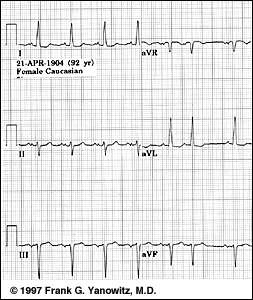Today I am going to give you a few examples of abnormal ECGs that are commonly asked in MRCP. However, remember a few basic facts first. Look at a normal ECG first!

1) Heart axis- if I and II are both ‘positive’, axis is normal.
2) If every P wave is followed by ORS, then it is sinus rhythm.
3) Normal PR interval is 0.12-0.20 sec.
4) Normal ORS width is less than 0.12s, if it is more than more than 0.12s, it suggests conduction defects.
5) QT interval- From QRS start to end of T wave. Usually QTc is used and it equals to QT interval divided by square root of RR interval. Normal value:0.35-0.43. ( I try to remember as 0.33-0.43, it is a popular question in MRCP Part 1 about causes of prolonged QT interval!)
6) ST segment: either elevation or depression implies infarction or ishaemia.
OK, today I am going to talk about abnormal heart axis. There are two types of abnormal axis either left axis deviation or right axis deviation.
1) Right axis deviation- You will know it if Lead I is negative.

Causes: All pathology causing right ventricular hypertrophy or strain such as cor pulmonale, pulmonary embolism.
2) Left axis deviation- You will notice this if Lead II and III are negative.

Causes: Left ventricular hypertrophy or strain. Such as hypertension, aortic stenosis.

No comments:
Post a Comment